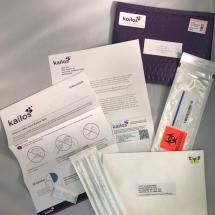Pharmacogenetics Can Help Eliminate Trial and Error Medication Regimens
Pharmacogenetics is the study of how your genes affect the way your body reacts to and processes medication. Kailos Genetics’ InspexionTM pharmacogenetic test targets several key genes responsible for processing a host of medications commonly prescribed to treat conditions such as chronic pain, cancer, high cholesterol, schizophrenia, and many other illnesses. Knowing specific variations in your genes can help your doctor personalize your healthcare and choose which medications and dosages will work best for your unique physiology.

Let’s look at a specific example. Charles1, a 33-year-old male, was diagnosed with bipolar type I disorder at the age of 20. Over a 13-year span, Charles had frequent relapses involving manic episodes and severe behavioral disruptions. He also experienced severe side effects to his prescribed medication including weight gain, spasms, tremors and sedation. Charles would often skip doses or stop taking his medication altogether due to the severe side effects, leading to frequent relapses. From 2006 to 2015, the patient was admitted to a psychiatric hospital 18 times for a total of 297 days.
Charles’ poor reactions and minimally positive responses to drug treatments led the patient to undergo several different drug regimens. These regimens combined different mood stabilizers, antipsychotics and benzodiazepines. In March of 2015, the patient was on five different prescribed pharmaceuticals, but was reacting poorly and was admitted to the hospital on an almost continuous basis for the months of January, February and March of 2015.
In March of 2015, the patient underwent pharmacogenetic testing. Results showed that Charles was a poor metabolizer, or his body was not good at processing, several of the medications that he was currently taking. Poor metabolizers of a specific medication are not able to process that medication very efficiently, which can magnify side effects. The testing also showed that he was a normal metabolizer of several other medications that could treat his bipolar disorder. His medication regimen was changed to a total of three medications: two medications were entirely new to him and one was a medication he was already taking.
Within two months of a progressive medication change, Charles and his clinicians observed both clinical improvements and a significant reduction in medication side effects. Within five months, Charles’ bipolar disorder symptoms were relieved, his functional behavior and mental organization were normal, and he showed an improvement in cognitive performance. Side effects such as irritability and insomnia disappeared. With the help of pharmacogenetic testing, Charles was able to resume a more normal life.2
Our case study clearly illustrates the advantage of pharmacogenetic testing versus multiple medication regimens in efficiently providing an optimized, personalized medication plan for every unique patient. Kailos Genetics’ Inspexion test provides your gene variation information for key genes involved in the processing of a variety of different medications, including antidepressants, cancer and blood pressure-lowering medications, which can be used by your healthcare provider to formulate the most effective treatment plan for you.
Please note that medications should never be adjusted based on pharmacogenetic testing results without first consulting with your healthcare professional.

DNA sample collection is simple and painless, using a cheek cell swab collection kit that can be performed at home. After testing is completed, you and your designated healthcare provider will have access to the results and can use the information to guide future treatment. When it comes to your health and well-being, Kailos understands how important it is to hit the ground running.




